Management and Leadership Report: M&S Case Study and Analysis
VerifiedAdded on 2020/06/03
|13
|3972
|65
Report
AI Summary
This report delves into the realms of leadership and management, utilizing Mark and Spencer plc (M&S) as a case study to illustrate key concepts. It begins by differentiating the roles and characteristics of leaders and managers, highlighting their responsibilities in achieving organizational goals. The report then explores the roles and functions of leaders and managers in various situations, such as decision-making, problem-solving, conflict resolution, and motivation. Furthermore, it applies different leadership theories, including situational, systems, and contingency theories, to understand how leaders can adapt their styles to various challenges. The report also examines key approaches to operational management, such as lean manufacturing, Six Sigma, dynamic approaches, Total Quality Management (TQM), and Just-in-Time (JIT) inventory management. Finally, it addresses the impact of various business environmental factors on operational management. The report aims to provide a comprehensive overview of leadership, management, and operational strategies within a business context.
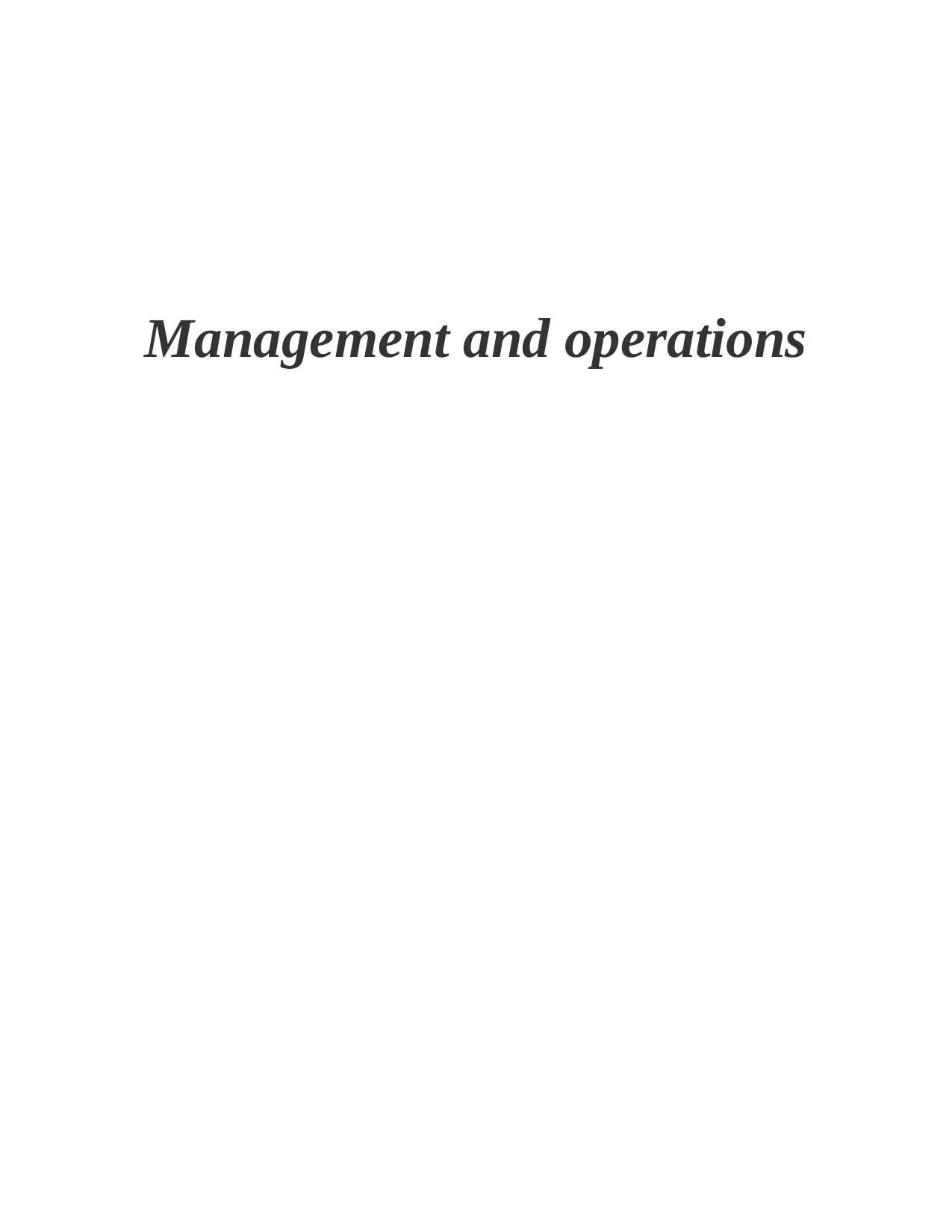
Management and operations
Paraphrase This Document
Need a fresh take? Get an instant paraphrase of this document with our AI Paraphraser
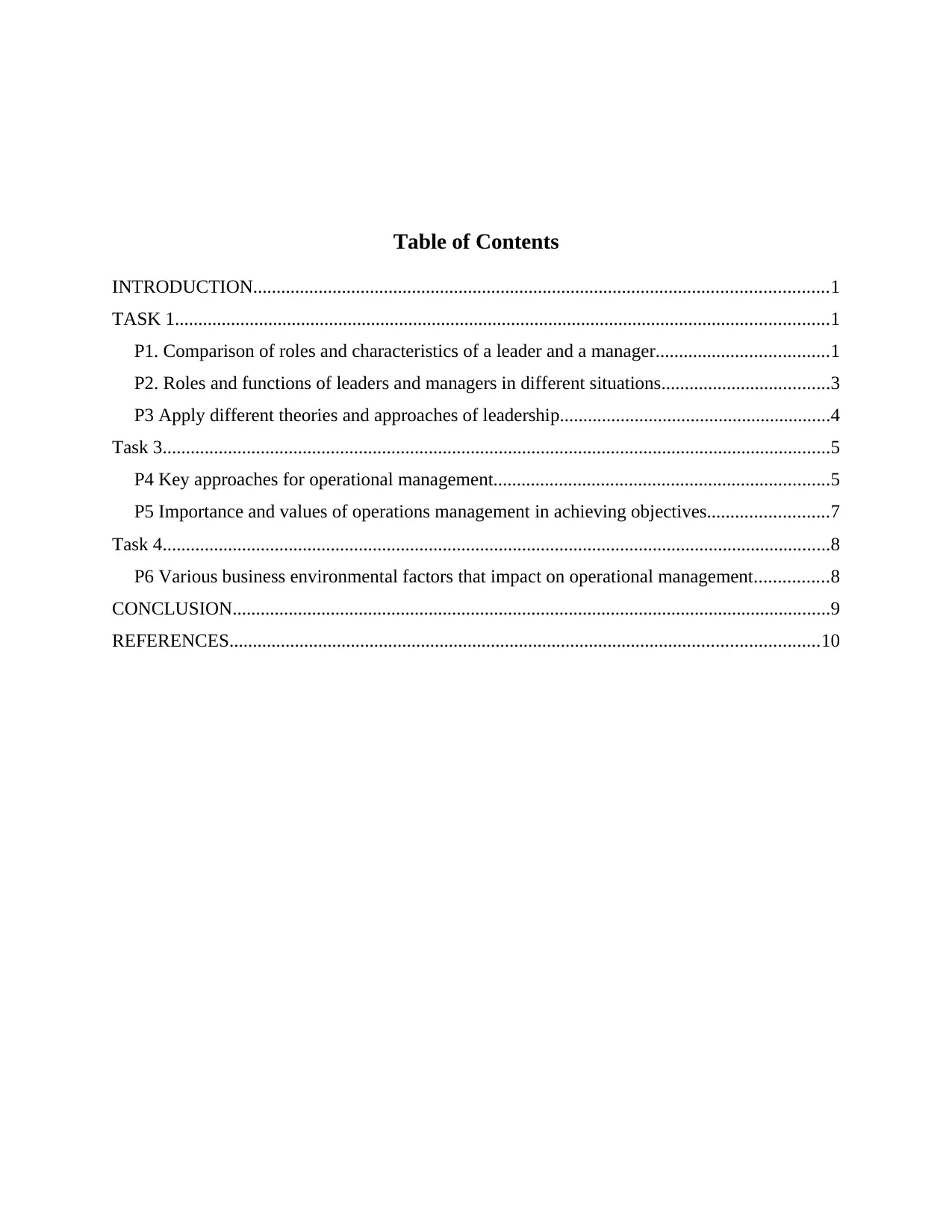
Table of Contents
INTRODUCTION...........................................................................................................................1
TASK 1............................................................................................................................................1
P1. Comparison of roles and characteristics of a leader and a manager.....................................1
P2. Roles and functions of leaders and managers in different situations....................................3
P3 Apply different theories and approaches of leadership..........................................................4
Task 3...............................................................................................................................................5
P4 Key approaches for operational management........................................................................5
P5 Importance and values of operations management in achieving objectives..........................7
Task 4...............................................................................................................................................8
P6 Various business environmental factors that impact on operational management................8
CONCLUSION................................................................................................................................9
REFERENCES..............................................................................................................................10
INTRODUCTION...........................................................................................................................1
TASK 1............................................................................................................................................1
P1. Comparison of roles and characteristics of a leader and a manager.....................................1
P2. Roles and functions of leaders and managers in different situations....................................3
P3 Apply different theories and approaches of leadership..........................................................4
Task 3...............................................................................................................................................5
P4 Key approaches for operational management........................................................................5
P5 Importance and values of operations management in achieving objectives..........................7
Task 4...............................................................................................................................................8
P6 Various business environmental factors that impact on operational management................8
CONCLUSION................................................................................................................................9
REFERENCES..............................................................................................................................10
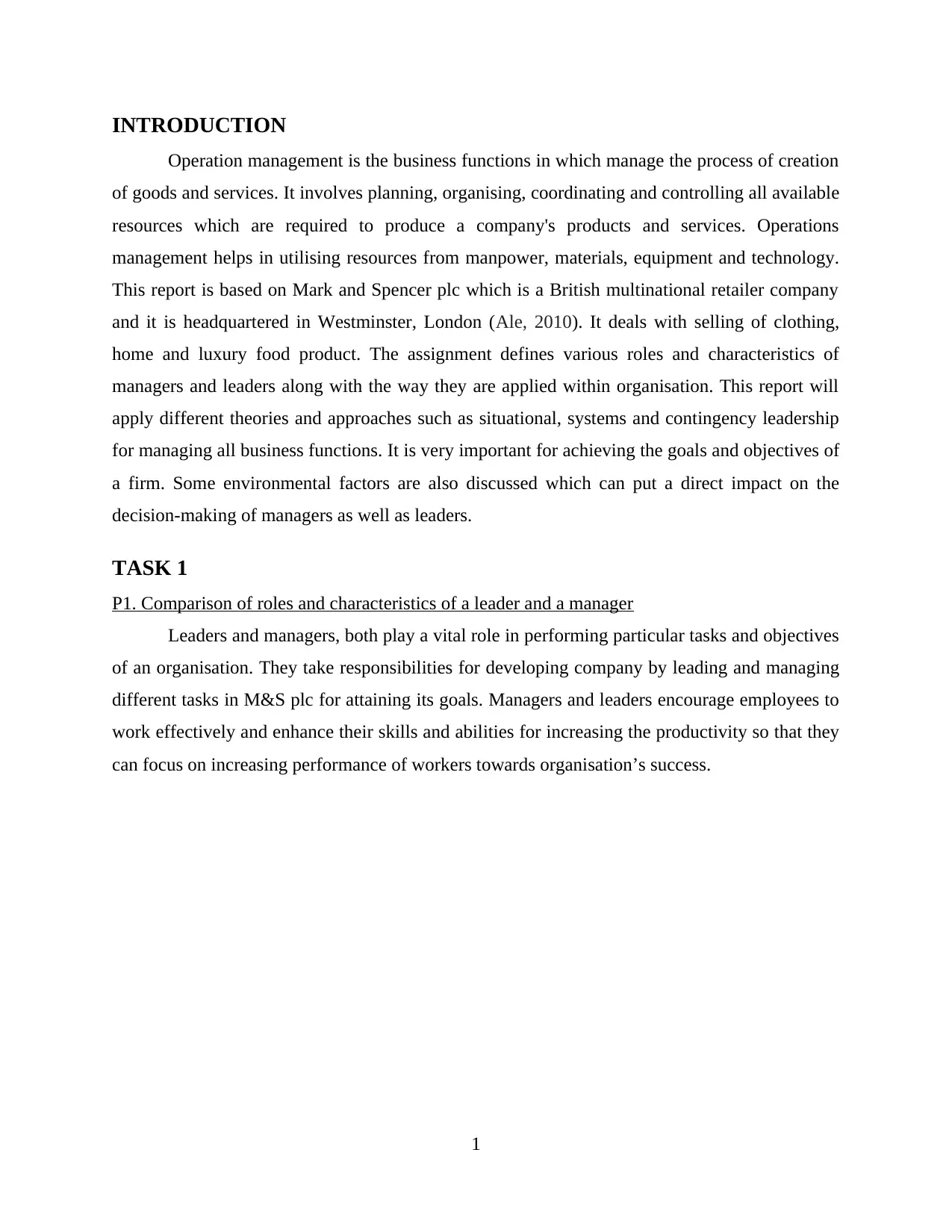
INTRODUCTION
Operation management is the business functions in which manage the process of creation
of goods and services. It involves planning, organising, coordinating and controlling all available
resources which are required to produce a company's products and services. Operations
management helps in utilising resources from manpower, materials, equipment and technology.
This report is based on Mark and Spencer plc which is a British multinational retailer company
and it is headquartered in Westminster, London (Ale, 2010). It deals with selling of clothing,
home and luxury food product. The assignment defines various roles and characteristics of
managers and leaders along with the way they are applied within organisation. This report will
apply different theories and approaches such as situational, systems and contingency leadership
for managing all business functions. It is very important for achieving the goals and objectives of
a firm. Some environmental factors are also discussed which can put a direct impact on the
decision-making of managers as well as leaders.
TASK 1
P1. Comparison of roles and characteristics of a leader and a manager
Leaders and managers, both play a vital role in performing particular tasks and objectives
of an organisation. They take responsibilities for developing company by leading and managing
different tasks in M&S plc for attaining its goals. Managers and leaders encourage employees to
work effectively and enhance their skills and abilities for increasing the productivity so that they
can focus on increasing performance of workers towards organisation’s success.
1
Operation management is the business functions in which manage the process of creation
of goods and services. It involves planning, organising, coordinating and controlling all available
resources which are required to produce a company's products and services. Operations
management helps in utilising resources from manpower, materials, equipment and technology.
This report is based on Mark and Spencer plc which is a British multinational retailer company
and it is headquartered in Westminster, London (Ale, 2010). It deals with selling of clothing,
home and luxury food product. The assignment defines various roles and characteristics of
managers and leaders along with the way they are applied within organisation. This report will
apply different theories and approaches such as situational, systems and contingency leadership
for managing all business functions. It is very important for achieving the goals and objectives of
a firm. Some environmental factors are also discussed which can put a direct impact on the
decision-making of managers as well as leaders.
TASK 1
P1. Comparison of roles and characteristics of a leader and a manager
Leaders and managers, both play a vital role in performing particular tasks and objectives
of an organisation. They take responsibilities for developing company by leading and managing
different tasks in M&S plc for attaining its goals. Managers and leaders encourage employees to
work effectively and enhance their skills and abilities for increasing the productivity so that they
can focus on increasing performance of workers towards organisation’s success.
1
⊘ This is a preview!⊘
Do you want full access?
Subscribe today to unlock all pages.

Trusted by 1+ million students worldwide
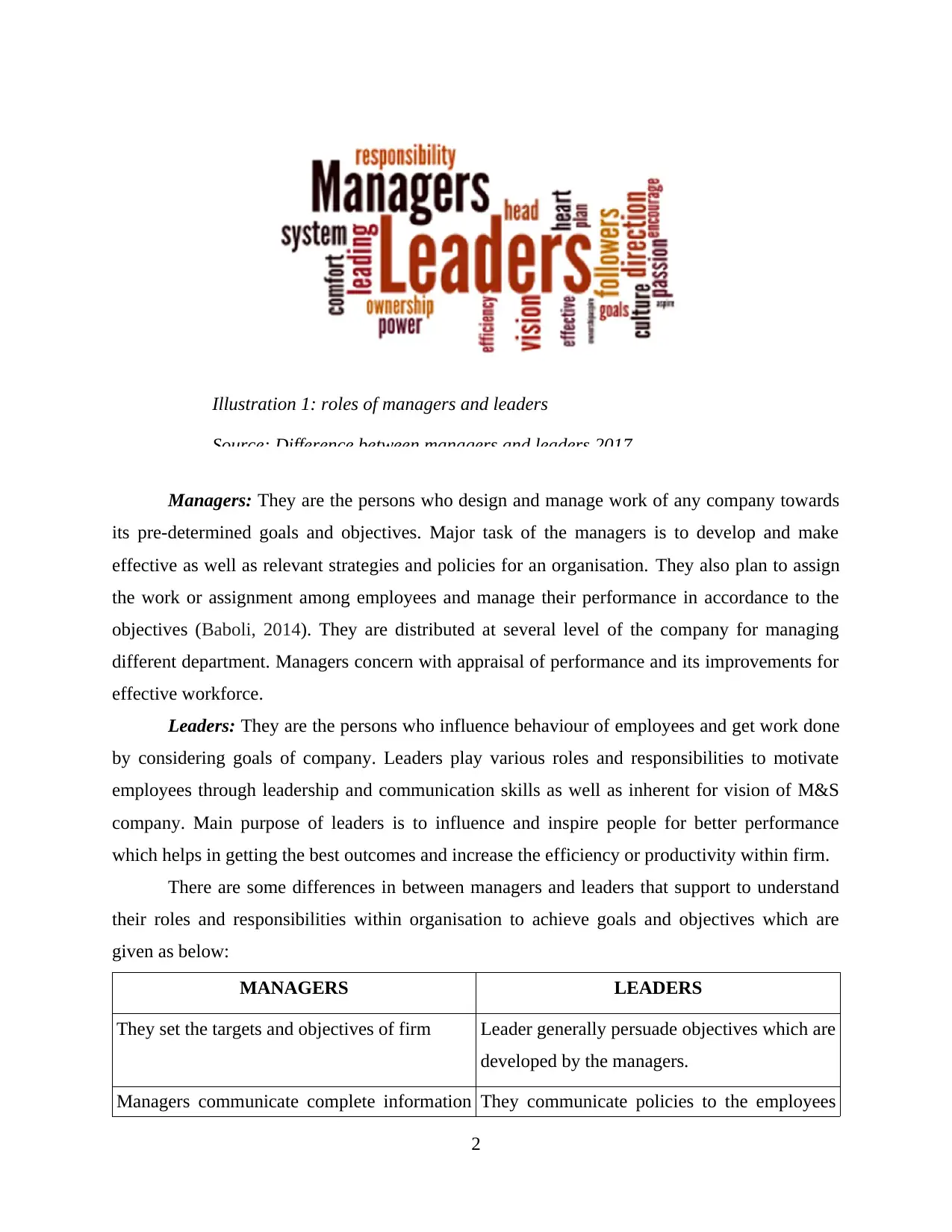
Managers: They are the persons who design and manage work of any company towards
its pre-determined goals and objectives. Major task of the managers is to develop and make
effective as well as relevant strategies and policies for an organisation. They also plan to assign
the work or assignment among employees and manage their performance in accordance to the
objectives (Baboli, 2014). They are distributed at several level of the company for managing
different department. Managers concern with appraisal of performance and its improvements for
effective workforce.
Leaders: They are the persons who influence behaviour of employees and get work done
by considering goals of company. Leaders play various roles and responsibilities to motivate
employees through leadership and communication skills as well as inherent for vision of M&S
company. Main purpose of leaders is to influence and inspire people for better performance
which helps in getting the best outcomes and increase the efficiency or productivity within firm.
There are some differences in between managers and leaders that support to understand
their roles and responsibilities within organisation to achieve goals and objectives which are
given as below:
MANAGERS LEADERS
They set the targets and objectives of firm Leader generally persuade objectives which are
developed by the managers.
Managers communicate complete information They communicate policies to the employees
2
Illustration 1: roles of managers and leaders
Source: Difference between managers and leaders 2017
its pre-determined goals and objectives. Major task of the managers is to develop and make
effective as well as relevant strategies and policies for an organisation. They also plan to assign
the work or assignment among employees and manage their performance in accordance to the
objectives (Baboli, 2014). They are distributed at several level of the company for managing
different department. Managers concern with appraisal of performance and its improvements for
effective workforce.
Leaders: They are the persons who influence behaviour of employees and get work done
by considering goals of company. Leaders play various roles and responsibilities to motivate
employees through leadership and communication skills as well as inherent for vision of M&S
company. Main purpose of leaders is to influence and inspire people for better performance
which helps in getting the best outcomes and increase the efficiency or productivity within firm.
There are some differences in between managers and leaders that support to understand
their roles and responsibilities within organisation to achieve goals and objectives which are
given as below:
MANAGERS LEADERS
They set the targets and objectives of firm Leader generally persuade objectives which are
developed by the managers.
Managers communicate complete information They communicate policies to the employees
2
Illustration 1: roles of managers and leaders
Source: Difference between managers and leaders 2017
Paraphrase This Document
Need a fresh take? Get an instant paraphrase of this document with our AI Paraphraser
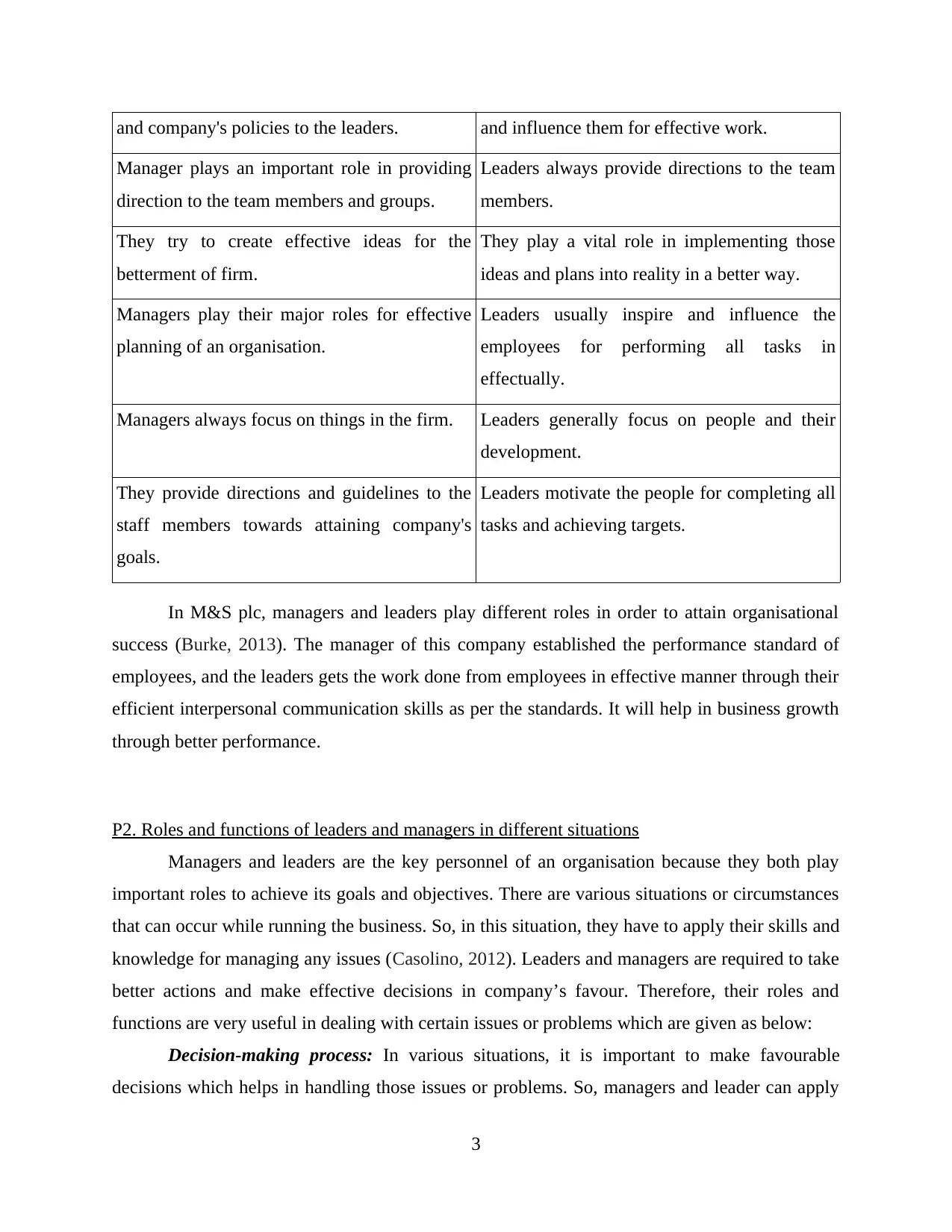
and company's policies to the leaders. and influence them for effective work.
Manager plays an important role in providing
direction to the team members and groups.
Leaders always provide directions to the team
members.
They try to create effective ideas for the
betterment of firm.
They play a vital role in implementing those
ideas and plans into reality in a better way.
Managers play their major roles for effective
planning of an organisation.
Leaders usually inspire and influence the
employees for performing all tasks in
effectually.
Managers always focus on things in the firm. Leaders generally focus on people and their
development.
They provide directions and guidelines to the
staff members towards attaining company's
goals.
Leaders motivate the people for completing all
tasks and achieving targets.
In M&S plc, managers and leaders play different roles in order to attain organisational
success (Burke, 2013). The manager of this company established the performance standard of
employees, and the leaders gets the work done from employees in effective manner through their
efficient interpersonal communication skills as per the standards. It will help in business growth
through better performance.
P2. Roles and functions of leaders and managers in different situations
Managers and leaders are the key personnel of an organisation because they both play
important roles to achieve its goals and objectives. There are various situations or circumstances
that can occur while running the business. So, in this situation, they have to apply their skills and
knowledge for managing any issues (Casolino, 2012). Leaders and managers are required to take
better actions and make effective decisions in company’s favour. Therefore, their roles and
functions are very useful in dealing with certain issues or problems which are given as below:
Decision-making process: In various situations, it is important to make favourable
decisions which helps in handling those issues or problems. So, managers and leader can apply
3
Manager plays an important role in providing
direction to the team members and groups.
Leaders always provide directions to the team
members.
They try to create effective ideas for the
betterment of firm.
They play a vital role in implementing those
ideas and plans into reality in a better way.
Managers play their major roles for effective
planning of an organisation.
Leaders usually inspire and influence the
employees for performing all tasks in
effectually.
Managers always focus on things in the firm. Leaders generally focus on people and their
development.
They provide directions and guidelines to the
staff members towards attaining company's
goals.
Leaders motivate the people for completing all
tasks and achieving targets.
In M&S plc, managers and leaders play different roles in order to attain organisational
success (Burke, 2013). The manager of this company established the performance standard of
employees, and the leaders gets the work done from employees in effective manner through their
efficient interpersonal communication skills as per the standards. It will help in business growth
through better performance.
P2. Roles and functions of leaders and managers in different situations
Managers and leaders are the key personnel of an organisation because they both play
important roles to achieve its goals and objectives. There are various situations or circumstances
that can occur while running the business. So, in this situation, they have to apply their skills and
knowledge for managing any issues (Casolino, 2012). Leaders and managers are required to take
better actions and make effective decisions in company’s favour. Therefore, their roles and
functions are very useful in dealing with certain issues or problems which are given as below:
Decision-making process: In various situations, it is important to make favourable
decisions which helps in handling those issues or problems. So, managers and leader can apply
3
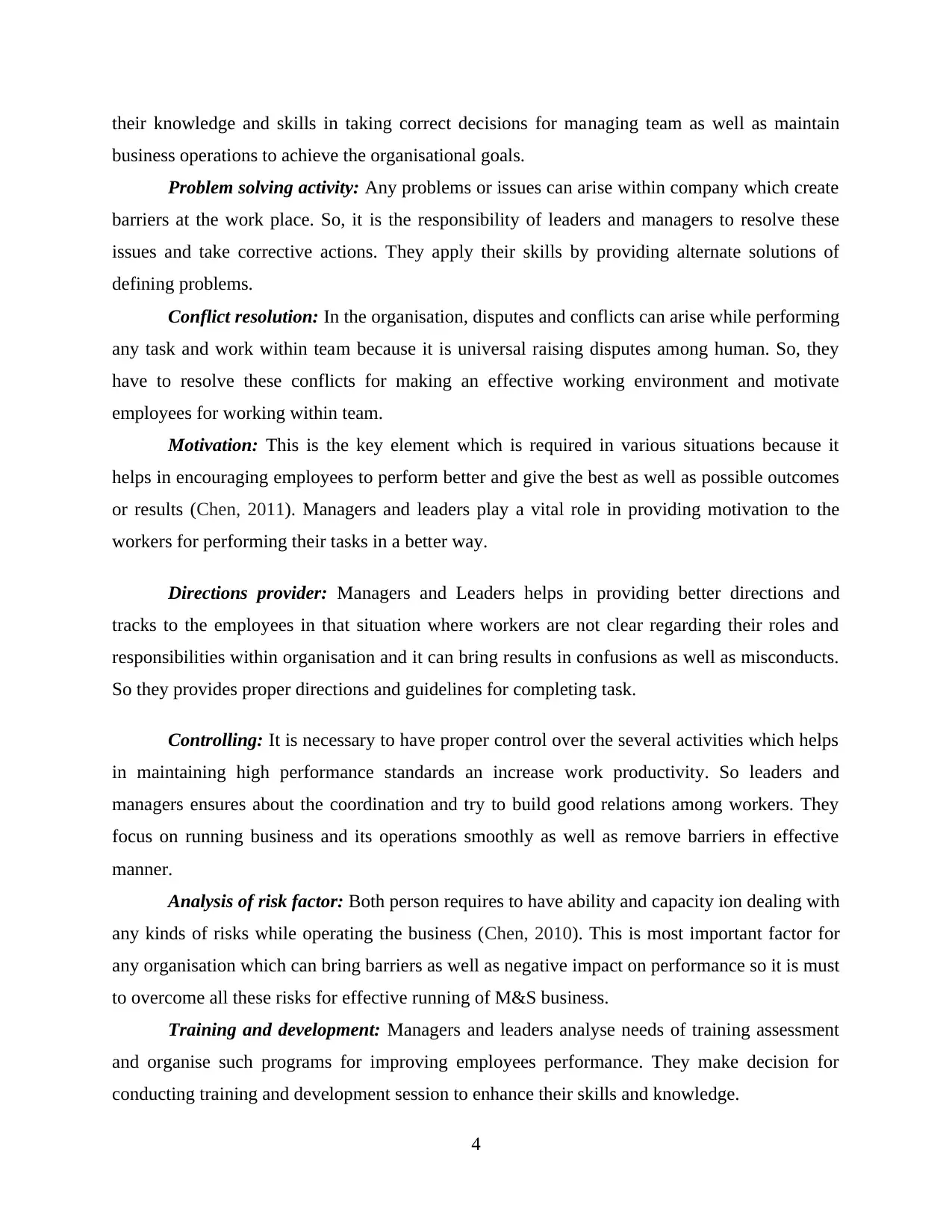
their knowledge and skills in taking correct decisions for managing team as well as maintain
business operations to achieve the organisational goals.
Problem solving activity: Any problems or issues can arise within company which create
barriers at the work place. So, it is the responsibility of leaders and managers to resolve these
issues and take corrective actions. They apply their skills by providing alternate solutions of
defining problems.
Conflict resolution: In the organisation, disputes and conflicts can arise while performing
any task and work within team because it is universal raising disputes among human. So, they
have to resolve these conflicts for making an effective working environment and motivate
employees for working within team.
Motivation: This is the key element which is required in various situations because it
helps in encouraging employees to perform better and give the best as well as possible outcomes
or results (Chen, 2011). Managers and leaders play a vital role in providing motivation to the
workers for performing their tasks in a better way.
Directions provider: Managers and Leaders helps in providing better directions and
tracks to the employees in that situation where workers are not clear regarding their roles and
responsibilities within organisation and it can bring results in confusions as well as misconducts.
So they provides proper directions and guidelines for completing task.
Controlling: It is necessary to have proper control over the several activities which helps
in maintaining high performance standards an increase work productivity. So leaders and
managers ensures about the coordination and try to build good relations among workers. They
focus on running business and its operations smoothly as well as remove barriers in effective
manner.
Analysis of risk factor: Both person requires to have ability and capacity ion dealing with
any kinds of risks while operating the business (Chen, 2010). This is most important factor for
any organisation which can bring barriers as well as negative impact on performance so it is must
to overcome all these risks for effective running of M&S business.
Training and development: Managers and leaders analyse needs of training assessment
and organise such programs for improving employees performance. They make decision for
conducting training and development session to enhance their skills and knowledge.
4
business operations to achieve the organisational goals.
Problem solving activity: Any problems or issues can arise within company which create
barriers at the work place. So, it is the responsibility of leaders and managers to resolve these
issues and take corrective actions. They apply their skills by providing alternate solutions of
defining problems.
Conflict resolution: In the organisation, disputes and conflicts can arise while performing
any task and work within team because it is universal raising disputes among human. So, they
have to resolve these conflicts for making an effective working environment and motivate
employees for working within team.
Motivation: This is the key element which is required in various situations because it
helps in encouraging employees to perform better and give the best as well as possible outcomes
or results (Chen, 2011). Managers and leaders play a vital role in providing motivation to the
workers for performing their tasks in a better way.
Directions provider: Managers and Leaders helps in providing better directions and
tracks to the employees in that situation where workers are not clear regarding their roles and
responsibilities within organisation and it can bring results in confusions as well as misconducts.
So they provides proper directions and guidelines for completing task.
Controlling: It is necessary to have proper control over the several activities which helps
in maintaining high performance standards an increase work productivity. So leaders and
managers ensures about the coordination and try to build good relations among workers. They
focus on running business and its operations smoothly as well as remove barriers in effective
manner.
Analysis of risk factor: Both person requires to have ability and capacity ion dealing with
any kinds of risks while operating the business (Chen, 2010). This is most important factor for
any organisation which can bring barriers as well as negative impact on performance so it is must
to overcome all these risks for effective running of M&S business.
Training and development: Managers and leaders analyse needs of training assessment
and organise such programs for improving employees performance. They make decision for
conducting training and development session to enhance their skills and knowledge.
4
⊘ This is a preview!⊘
Do you want full access?
Subscribe today to unlock all pages.

Trusted by 1+ million students worldwide
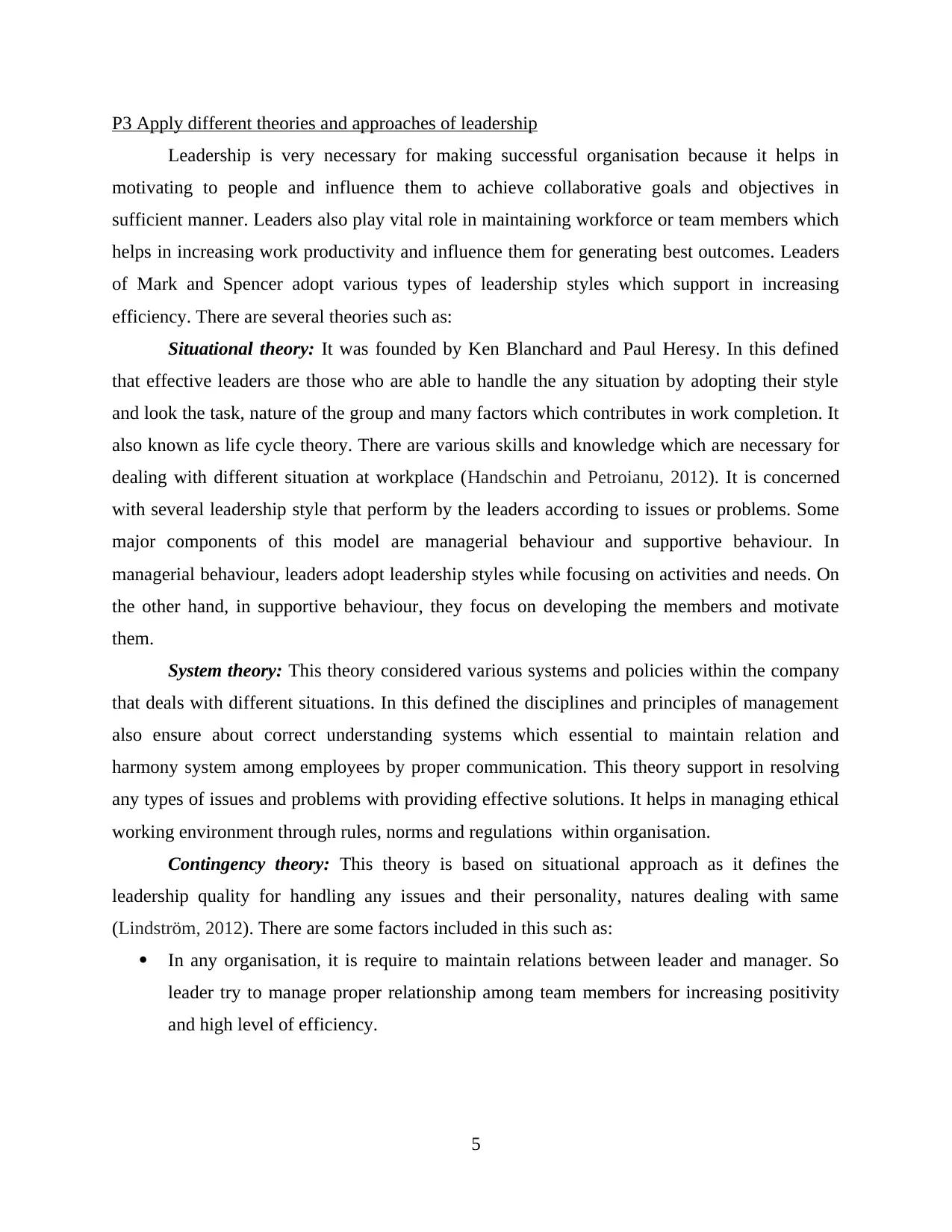
P3 Apply different theories and approaches of leadership
Leadership is very necessary for making successful organisation because it helps in
motivating to people and influence them to achieve collaborative goals and objectives in
sufficient manner. Leaders also play vital role in maintaining workforce or team members which
helps in increasing work productivity and influence them for generating best outcomes. Leaders
of Mark and Spencer adopt various types of leadership styles which support in increasing
efficiency. There are several theories such as:
Situational theory: It was founded by Ken Blanchard and Paul Heresy. In this defined
that effective leaders are those who are able to handle the any situation by adopting their style
and look the task, nature of the group and many factors which contributes in work completion. It
also known as life cycle theory. There are various skills and knowledge which are necessary for
dealing with different situation at workplace (Handschin and Petroianu, 2012). It is concerned
with several leadership style that perform by the leaders according to issues or problems. Some
major components of this model are managerial behaviour and supportive behaviour. In
managerial behaviour, leaders adopt leadership styles while focusing on activities and needs. On
the other hand, in supportive behaviour, they focus on developing the members and motivate
them.
System theory: This theory considered various systems and policies within the company
that deals with different situations. In this defined the disciplines and principles of management
also ensure about correct understanding systems which essential to maintain relation and
harmony system among employees by proper communication. This theory support in resolving
any types of issues and problems with providing effective solutions. It helps in managing ethical
working environment through rules, norms and regulations within organisation.
Contingency theory: This theory is based on situational approach as it defines the
leadership quality for handling any issues and their personality, natures dealing with same
(Lindström, 2012). There are some factors included in this such as:
In any organisation, it is require to maintain relations between leader and manager. So
leader try to manage proper relationship among team members for increasing positivity
and high level of efficiency.
5
Leadership is very necessary for making successful organisation because it helps in
motivating to people and influence them to achieve collaborative goals and objectives in
sufficient manner. Leaders also play vital role in maintaining workforce or team members which
helps in increasing work productivity and influence them for generating best outcomes. Leaders
of Mark and Spencer adopt various types of leadership styles which support in increasing
efficiency. There are several theories such as:
Situational theory: It was founded by Ken Blanchard and Paul Heresy. In this defined
that effective leaders are those who are able to handle the any situation by adopting their style
and look the task, nature of the group and many factors which contributes in work completion. It
also known as life cycle theory. There are various skills and knowledge which are necessary for
dealing with different situation at workplace (Handschin and Petroianu, 2012). It is concerned
with several leadership style that perform by the leaders according to issues or problems. Some
major components of this model are managerial behaviour and supportive behaviour. In
managerial behaviour, leaders adopt leadership styles while focusing on activities and needs. On
the other hand, in supportive behaviour, they focus on developing the members and motivate
them.
System theory: This theory considered various systems and policies within the company
that deals with different situations. In this defined the disciplines and principles of management
also ensure about correct understanding systems which essential to maintain relation and
harmony system among employees by proper communication. This theory support in resolving
any types of issues and problems with providing effective solutions. It helps in managing ethical
working environment through rules, norms and regulations within organisation.
Contingency theory: This theory is based on situational approach as it defines the
leadership quality for handling any issues and their personality, natures dealing with same
(Lindström, 2012). There are some factors included in this such as:
In any organisation, it is require to maintain relations between leader and manager. So
leader try to manage proper relationship among team members for increasing positivity
and high level of efficiency.
5
Paraphrase This Document
Need a fresh take? Get an instant paraphrase of this document with our AI Paraphraser
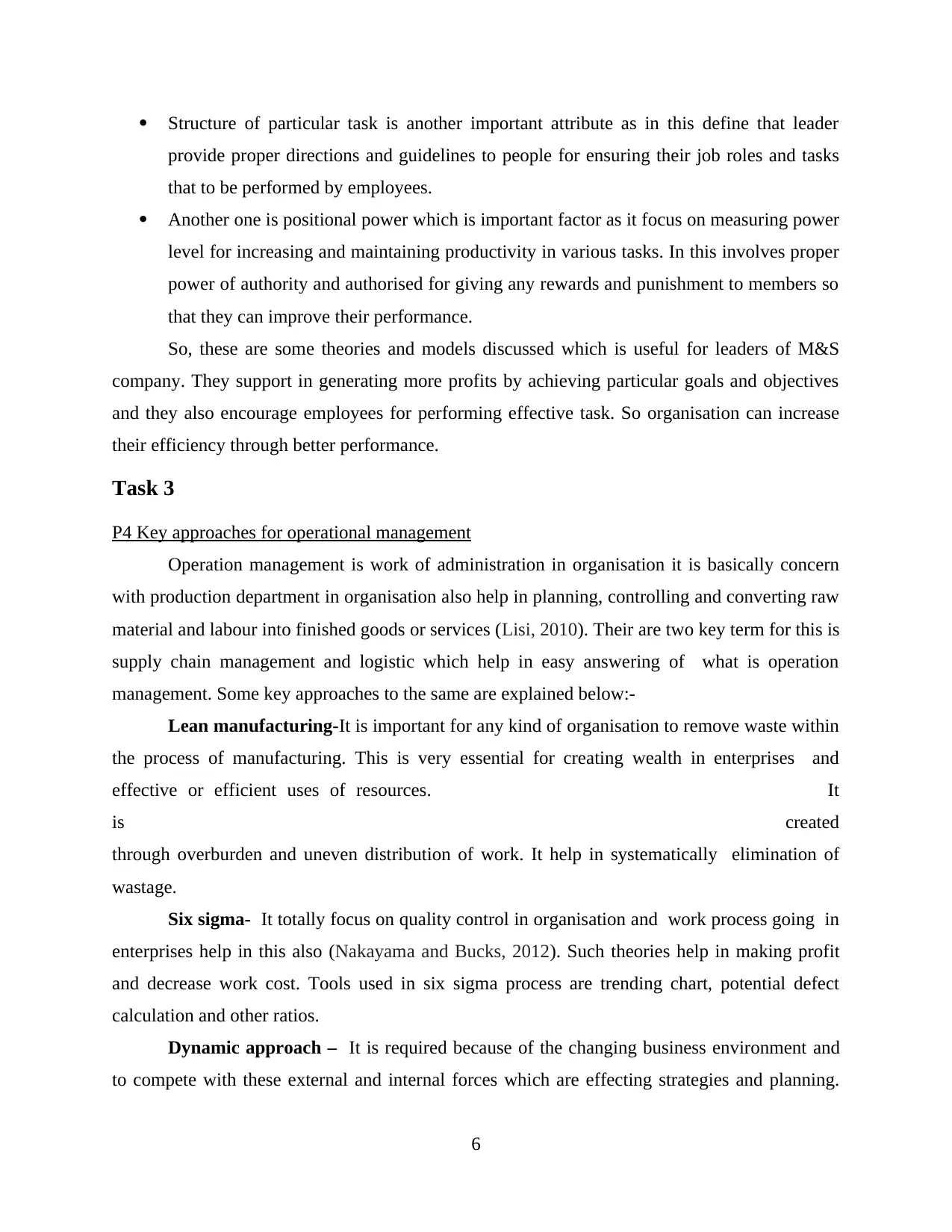
Structure of particular task is another important attribute as in this define that leader
provide proper directions and guidelines to people for ensuring their job roles and tasks
that to be performed by employees.
Another one is positional power which is important factor as it focus on measuring power
level for increasing and maintaining productivity in various tasks. In this involves proper
power of authority and authorised for giving any rewards and punishment to members so
that they can improve their performance.
So, these are some theories and models discussed which is useful for leaders of M&S
company. They support in generating more profits by achieving particular goals and objectives
and they also encourage employees for performing effective task. So organisation can increase
their efficiency through better performance.
Task 3
P4 Key approaches for operational management
Operation management is work of administration in organisation it is basically concern
with production department in organisation also help in planning, controlling and converting raw
material and labour into finished goods or services (Lisi, 2010). Their are two key term for this is
supply chain management and logistic which help in easy answering of what is operation
management. Some key approaches to the same are explained below:-
Lean manufacturing-It is important for any kind of organisation to remove waste within
the process of manufacturing. This is very essential for creating wealth in enterprises and
effective or efficient uses of resources. It
is created
through overburden and uneven distribution of work. It help in systematically elimination of
wastage.
Six sigma- It totally focus on quality control in organisation and work process going in
enterprises help in this also (Nakayama and Bucks, 2012). Such theories help in making profit
and decrease work cost. Tools used in six sigma process are trending chart, potential defect
calculation and other ratios.
Dynamic approach – It is required because of the changing business environment and
to compete with these external and internal forces which are effecting strategies and planning.
6
provide proper directions and guidelines to people for ensuring their job roles and tasks
that to be performed by employees.
Another one is positional power which is important factor as it focus on measuring power
level for increasing and maintaining productivity in various tasks. In this involves proper
power of authority and authorised for giving any rewards and punishment to members so
that they can improve their performance.
So, these are some theories and models discussed which is useful for leaders of M&S
company. They support in generating more profits by achieving particular goals and objectives
and they also encourage employees for performing effective task. So organisation can increase
their efficiency through better performance.
Task 3
P4 Key approaches for operational management
Operation management is work of administration in organisation it is basically concern
with production department in organisation also help in planning, controlling and converting raw
material and labour into finished goods or services (Lisi, 2010). Their are two key term for this is
supply chain management and logistic which help in easy answering of what is operation
management. Some key approaches to the same are explained below:-
Lean manufacturing-It is important for any kind of organisation to remove waste within
the process of manufacturing. This is very essential for creating wealth in enterprises and
effective or efficient uses of resources. It
is created
through overburden and uneven distribution of work. It help in systematically elimination of
wastage.
Six sigma- It totally focus on quality control in organisation and work process going in
enterprises help in this also (Nakayama and Bucks, 2012). Such theories help in making profit
and decrease work cost. Tools used in six sigma process are trending chart, potential defect
calculation and other ratios.
Dynamic approach – It is required because of the changing business environment and
to compete with these external and internal forces which are effecting strategies and planning.
6
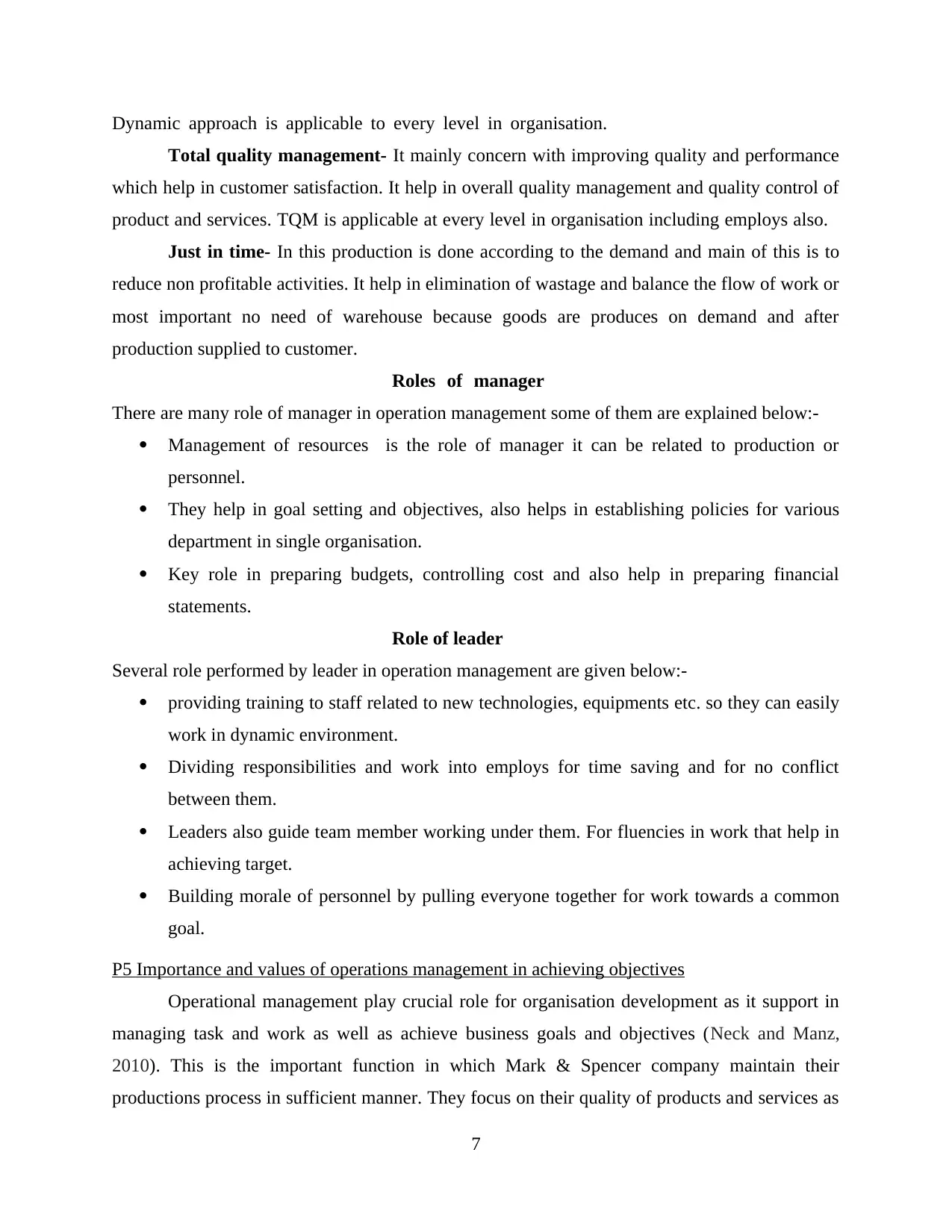
Dynamic approach is applicable to every level in organisation.
Total quality management- It mainly concern with improving quality and performance
which help in customer satisfaction. It help in overall quality management and quality control of
product and services. TQM is applicable at every level in organisation including employs also.
Just in time- In this production is done according to the demand and main of this is to
reduce non profitable activities. It help in elimination of wastage and balance the flow of work or
most important no need of warehouse because goods are produces on demand and after
production supplied to customer.
Roles of manager
There are many role of manager in operation management some of them are explained below:-
Management of resources is the role of manager it can be related to production or
personnel.
They help in goal setting and objectives, also helps in establishing policies for various
department in single organisation.
Key role in preparing budgets, controlling cost and also help in preparing financial
statements.
Role of leader
Several role performed by leader in operation management are given below:-
providing training to staff related to new technologies, equipments etc. so they can easily
work in dynamic environment.
Dividing responsibilities and work into employs for time saving and for no conflict
between them.
Leaders also guide team member working under them. For fluencies in work that help in
achieving target.
Building morale of personnel by pulling everyone together for work towards a common
goal.
P5 Importance and values of operations management in achieving objectives
Operational management play crucial role for organisation development as it support in
managing task and work as well as achieve business goals and objectives (Neck and Manz,
2010). This is the important function in which Mark & Spencer company maintain their
productions process in sufficient manner. They focus on their quality of products and services as
7
Total quality management- It mainly concern with improving quality and performance
which help in customer satisfaction. It help in overall quality management and quality control of
product and services. TQM is applicable at every level in organisation including employs also.
Just in time- In this production is done according to the demand and main of this is to
reduce non profitable activities. It help in elimination of wastage and balance the flow of work or
most important no need of warehouse because goods are produces on demand and after
production supplied to customer.
Roles of manager
There are many role of manager in operation management some of them are explained below:-
Management of resources is the role of manager it can be related to production or
personnel.
They help in goal setting and objectives, also helps in establishing policies for various
department in single organisation.
Key role in preparing budgets, controlling cost and also help in preparing financial
statements.
Role of leader
Several role performed by leader in operation management are given below:-
providing training to staff related to new technologies, equipments etc. so they can easily
work in dynamic environment.
Dividing responsibilities and work into employs for time saving and for no conflict
between them.
Leaders also guide team member working under them. For fluencies in work that help in
achieving target.
Building morale of personnel by pulling everyone together for work towards a common
goal.
P5 Importance and values of operations management in achieving objectives
Operational management play crucial role for organisation development as it support in
managing task and work as well as achieve business goals and objectives (Neck and Manz,
2010). This is the important function in which Mark & Spencer company maintain their
productions process in sufficient manner. They focus on their quality of products and services as
7
⊘ This is a preview!⊘
Do you want full access?
Subscribe today to unlock all pages.

Trusted by 1+ million students worldwide
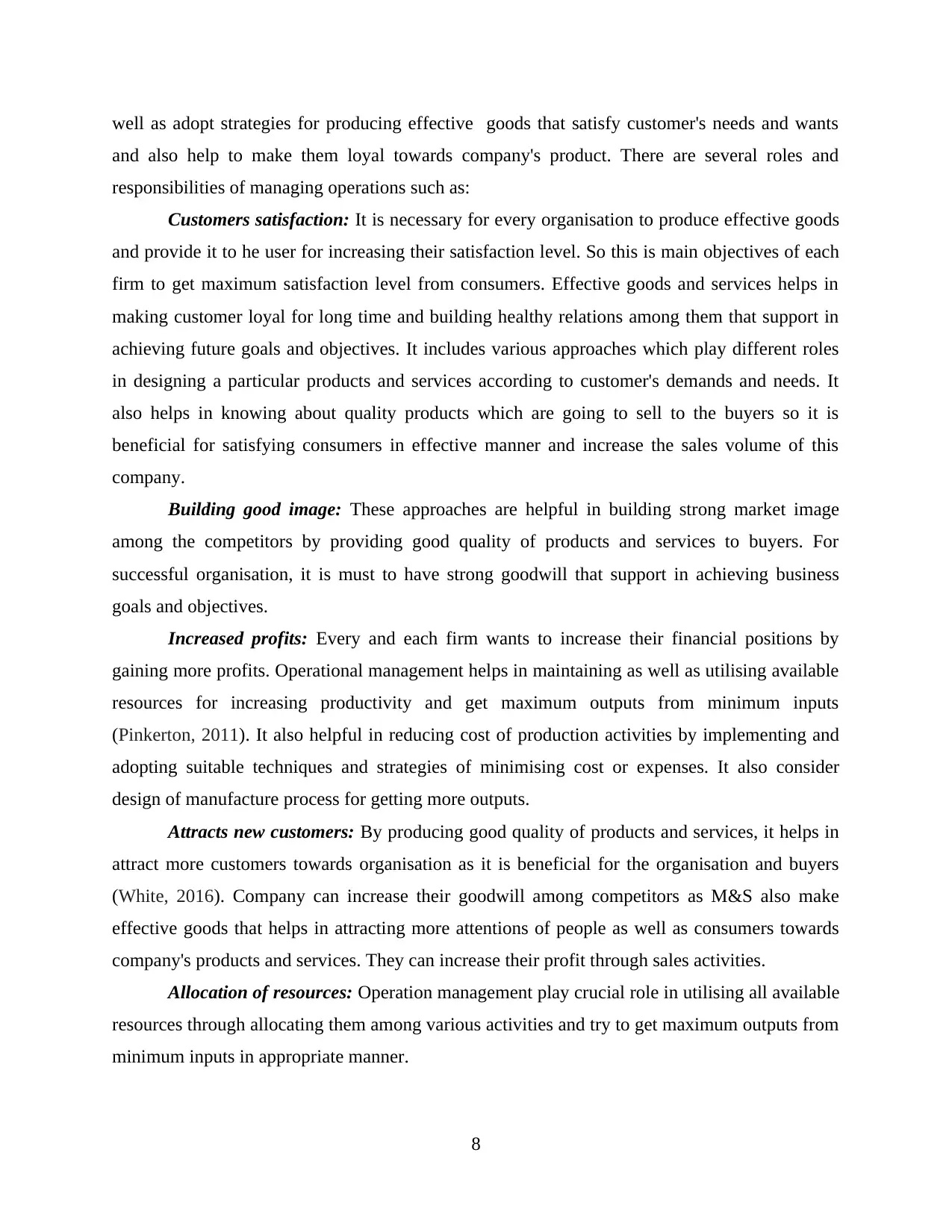
well as adopt strategies for producing effective goods that satisfy customer's needs and wants
and also help to make them loyal towards company's product. There are several roles and
responsibilities of managing operations such as:
Customers satisfaction: It is necessary for every organisation to produce effective goods
and provide it to he user for increasing their satisfaction level. So this is main objectives of each
firm to get maximum satisfaction level from consumers. Effective goods and services helps in
making customer loyal for long time and building healthy relations among them that support in
achieving future goals and objectives. It includes various approaches which play different roles
in designing a particular products and services according to customer's demands and needs. It
also helps in knowing about quality products which are going to sell to the buyers so it is
beneficial for satisfying consumers in effective manner and increase the sales volume of this
company.
Building good image: These approaches are helpful in building strong market image
among the competitors by providing good quality of products and services to buyers. For
successful organisation, it is must to have strong goodwill that support in achieving business
goals and objectives.
Increased profits: Every and each firm wants to increase their financial positions by
gaining more profits. Operational management helps in maintaining as well as utilising available
resources for increasing productivity and get maximum outputs from minimum inputs
(Pinkerton, 2011). It also helpful in reducing cost of production activities by implementing and
adopting suitable techniques and strategies of minimising cost or expenses. It also consider
design of manufacture process for getting more outputs.
Attracts new customers: By producing good quality of products and services, it helps in
attract more customers towards organisation as it is beneficial for the organisation and buyers
(White, 2016). Company can increase their goodwill among competitors as M&S also make
effective goods that helps in attracting more attentions of people as well as consumers towards
company's products and services. They can increase their profit through sales activities.
Allocation of resources: Operation management play crucial role in utilising all available
resources through allocating them among various activities and try to get maximum outputs from
minimum inputs in appropriate manner.
8
and also help to make them loyal towards company's product. There are several roles and
responsibilities of managing operations such as:
Customers satisfaction: It is necessary for every organisation to produce effective goods
and provide it to he user for increasing their satisfaction level. So this is main objectives of each
firm to get maximum satisfaction level from consumers. Effective goods and services helps in
making customer loyal for long time and building healthy relations among them that support in
achieving future goals and objectives. It includes various approaches which play different roles
in designing a particular products and services according to customer's demands and needs. It
also helps in knowing about quality products which are going to sell to the buyers so it is
beneficial for satisfying consumers in effective manner and increase the sales volume of this
company.
Building good image: These approaches are helpful in building strong market image
among the competitors by providing good quality of products and services to buyers. For
successful organisation, it is must to have strong goodwill that support in achieving business
goals and objectives.
Increased profits: Every and each firm wants to increase their financial positions by
gaining more profits. Operational management helps in maintaining as well as utilising available
resources for increasing productivity and get maximum outputs from minimum inputs
(Pinkerton, 2011). It also helpful in reducing cost of production activities by implementing and
adopting suitable techniques and strategies of minimising cost or expenses. It also consider
design of manufacture process for getting more outputs.
Attracts new customers: By producing good quality of products and services, it helps in
attract more customers towards organisation as it is beneficial for the organisation and buyers
(White, 2016). Company can increase their goodwill among competitors as M&S also make
effective goods that helps in attracting more attentions of people as well as consumers towards
company's products and services. They can increase their profit through sales activities.
Allocation of resources: Operation management play crucial role in utilising all available
resources through allocating them among various activities and try to get maximum outputs from
minimum inputs in appropriate manner.
8
Paraphrase This Document
Need a fresh take? Get an instant paraphrase of this document with our AI Paraphraser
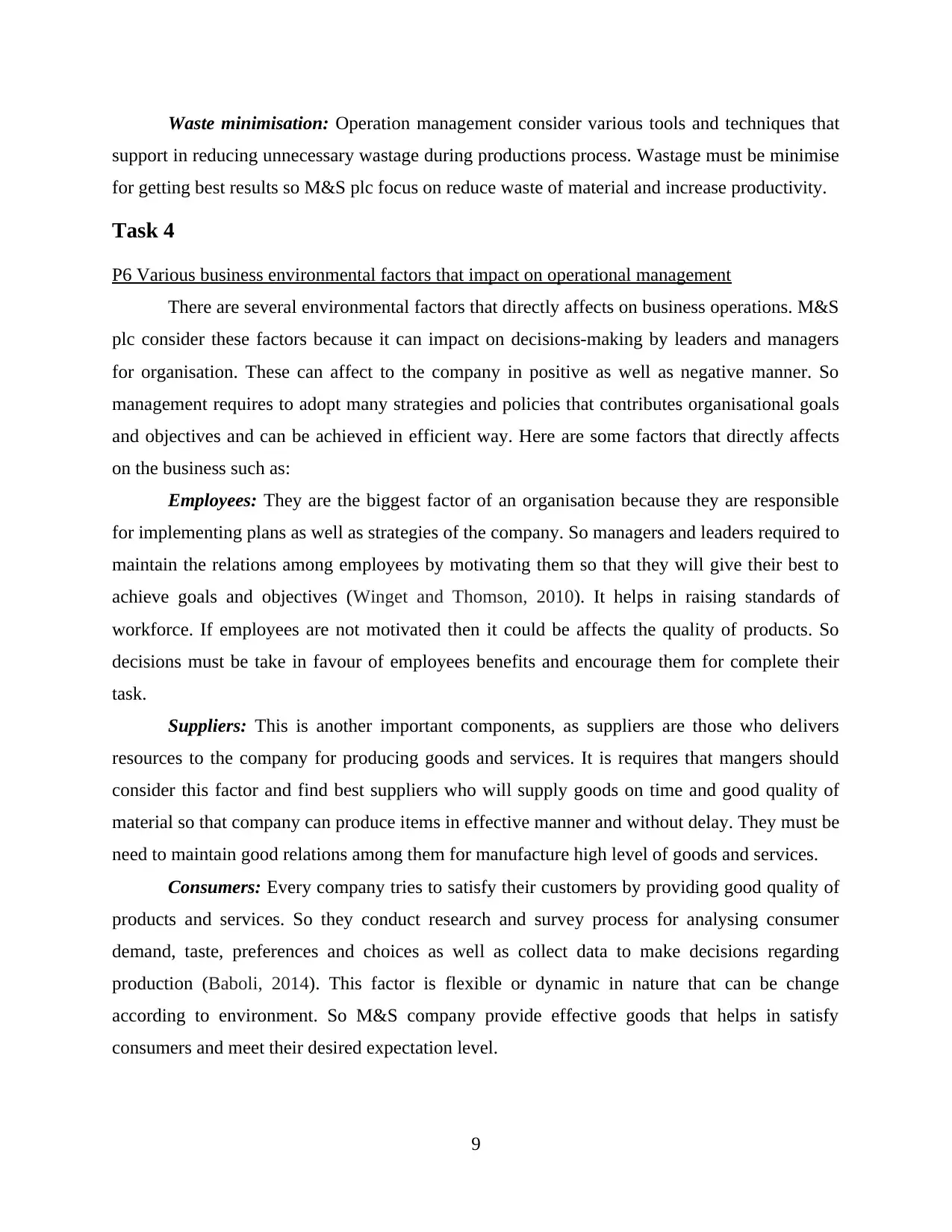
Waste minimisation: Operation management consider various tools and techniques that
support in reducing unnecessary wastage during productions process. Wastage must be minimise
for getting best results so M&S plc focus on reduce waste of material and increase productivity.
Task 4
P6 Various business environmental factors that impact on operational management
There are several environmental factors that directly affects on business operations. M&S
plc consider these factors because it can impact on decisions-making by leaders and managers
for organisation. These can affect to the company in positive as well as negative manner. So
management requires to adopt many strategies and policies that contributes organisational goals
and objectives and can be achieved in efficient way. Here are some factors that directly affects
on the business such as:
Employees: They are the biggest factor of an organisation because they are responsible
for implementing plans as well as strategies of the company. So managers and leaders required to
maintain the relations among employees by motivating them so that they will give their best to
achieve goals and objectives (Winget and Thomson, 2010). It helps in raising standards of
workforce. If employees are not motivated then it could be affects the quality of products. So
decisions must be take in favour of employees benefits and encourage them for complete their
task.
Suppliers: This is another important components, as suppliers are those who delivers
resources to the company for producing goods and services. It is requires that mangers should
consider this factor and find best suppliers who will supply goods on time and good quality of
material so that company can produce items in effective manner and without delay. They must be
need to maintain good relations among them for manufacture high level of goods and services.
Consumers: Every company tries to satisfy their customers by providing good quality of
products and services. So they conduct research and survey process for analysing consumer
demand, taste, preferences and choices as well as collect data to make decisions regarding
production (Baboli, 2014). This factor is flexible or dynamic in nature that can be change
according to environment. So M&S company provide effective goods that helps in satisfy
consumers and meet their desired expectation level.
9
support in reducing unnecessary wastage during productions process. Wastage must be minimise
for getting best results so M&S plc focus on reduce waste of material and increase productivity.
Task 4
P6 Various business environmental factors that impact on operational management
There are several environmental factors that directly affects on business operations. M&S
plc consider these factors because it can impact on decisions-making by leaders and managers
for organisation. These can affect to the company in positive as well as negative manner. So
management requires to adopt many strategies and policies that contributes organisational goals
and objectives and can be achieved in efficient way. Here are some factors that directly affects
on the business such as:
Employees: They are the biggest factor of an organisation because they are responsible
for implementing plans as well as strategies of the company. So managers and leaders required to
maintain the relations among employees by motivating them so that they will give their best to
achieve goals and objectives (Winget and Thomson, 2010). It helps in raising standards of
workforce. If employees are not motivated then it could be affects the quality of products. So
decisions must be take in favour of employees benefits and encourage them for complete their
task.
Suppliers: This is another important components, as suppliers are those who delivers
resources to the company for producing goods and services. It is requires that mangers should
consider this factor and find best suppliers who will supply goods on time and good quality of
material so that company can produce items in effective manner and without delay. They must be
need to maintain good relations among them for manufacture high level of goods and services.
Consumers: Every company tries to satisfy their customers by providing good quality of
products and services. So they conduct research and survey process for analysing consumer
demand, taste, preferences and choices as well as collect data to make decisions regarding
production (Baboli, 2014). This factor is flexible or dynamic in nature that can be change
according to environment. So M&S company provide effective goods that helps in satisfy
consumers and meet their desired expectation level.
9
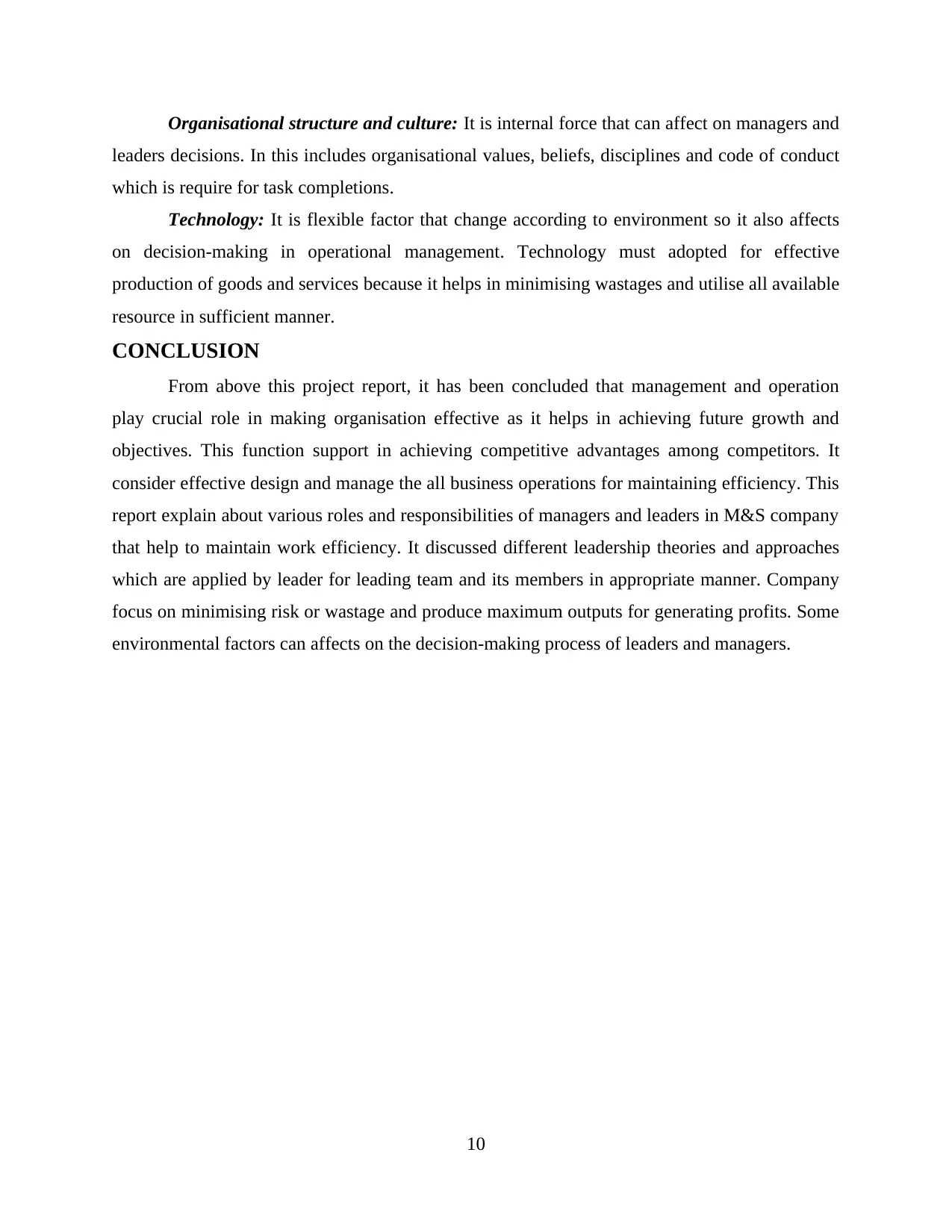
Organisational structure and culture: It is internal force that can affect on managers and
leaders decisions. In this includes organisational values, beliefs, disciplines and code of conduct
which is require for task completions.
Technology: It is flexible factor that change according to environment so it also affects
on decision-making in operational management. Technology must adopted for effective
production of goods and services because it helps in minimising wastages and utilise all available
resource in sufficient manner.
CONCLUSION
From above this project report, it has been concluded that management and operation
play crucial role in making organisation effective as it helps in achieving future growth and
objectives. This function support in achieving competitive advantages among competitors. It
consider effective design and manage the all business operations for maintaining efficiency. This
report explain about various roles and responsibilities of managers and leaders in M&S company
that help to maintain work efficiency. It discussed different leadership theories and approaches
which are applied by leader for leading team and its members in appropriate manner. Company
focus on minimising risk or wastage and produce maximum outputs for generating profits. Some
environmental factors can affects on the decision-making process of leaders and managers.
10
leaders decisions. In this includes organisational values, beliefs, disciplines and code of conduct
which is require for task completions.
Technology: It is flexible factor that change according to environment so it also affects
on decision-making in operational management. Technology must adopted for effective
production of goods and services because it helps in minimising wastages and utilise all available
resource in sufficient manner.
CONCLUSION
From above this project report, it has been concluded that management and operation
play crucial role in making organisation effective as it helps in achieving future growth and
objectives. This function support in achieving competitive advantages among competitors. It
consider effective design and manage the all business operations for maintaining efficiency. This
report explain about various roles and responsibilities of managers and leaders in M&S company
that help to maintain work efficiency. It discussed different leadership theories and approaches
which are applied by leader for leading team and its members in appropriate manner. Company
focus on minimising risk or wastage and produce maximum outputs for generating profits. Some
environmental factors can affects on the decision-making process of leaders and managers.
10
⊘ This is a preview!⊘
Do you want full access?
Subscribe today to unlock all pages.

Trusted by 1+ million students worldwide
1 out of 13
Related Documents
Your All-in-One AI-Powered Toolkit for Academic Success.
+13062052269
info@desklib.com
Available 24*7 on WhatsApp / Email
![[object Object]](/_next/static/media/star-bottom.7253800d.svg)
Unlock your academic potential
Copyright © 2020–2026 A2Z Services. All Rights Reserved. Developed and managed by ZUCOL.





